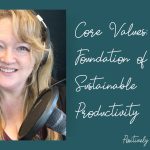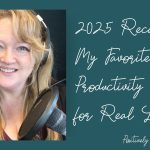The world today feels heavy. Between constant global uncertainty and the persistent hum of our own personal responsibilities, it’s no surprise that many of us feel like we’re running on a loop of consistent stress. It’s a persistent level of stress, characterized by an ongoing state of heightened stress response, which quickly becomes distress. It is simply distressing to always feel stressed.
In this episode of The Positively Living Podcast, Julie Leonard and I explore the roots of this pervasive anxiety and offer a clear path toward cultivating resilience, managing internal dialogue, and ultimately living an intentionally happy life.
The Inner Dialogue of Distress
Julie Leonard’s experience in coaching has revealed a common thread: suffering often stems from our thoughts, our internal thinking. We’ve all experienced the feeling of being stuck in our own heads, looping over something that went wrong or worrying endlessly about what might happen next. This cycle of rumination brings us down and prevents us from being present and truly kind to ourselves.
Our conversation stresses that this persistent level of stress is not only uncomfortable but also unnatural. Our bodies are designed to peak in response to stress and then return to a baseline of calm. When we are constantly bombarded, that baseline is elevated, leading to chronic distress. The core of solving this problem, according to Julie, is “getting in our head” to address the thinking that fuels this persistent, exhausting state.
Redefining Happiness: It’s Not About Pretending
The term “happiness” often feels loaded. For many, it suggests an obligation to pretend everything is fine, or an unattainable, lofty goal. However, we reject this notion. Instead, we anchor the definition of happiness in practicality and resilience.
In her research and coaching, Julie found that when asked what happiness means to them, people consistently use words like “balance,” “calm,” and “resilience,” along with “finding joy every day.” Happiness is not the absence of problems; it is having the tools and the ability to handle what life throws at you. It is about building an internal framework that allows you to surf the waves of life instead of being knocked over by them.
This perspective aligns with positive psychology research, which challenges the societal emphasis on external happiness. We have been conditioned to believe that the more we attain—material goods, professional milestones, a certain income level—the happier we will be. While a certain level of security is necessary for foundational wellbeing, studies show that at a specific point, increased income no longer correlates with increased happiness. The pursuit of more becomes a hedonic treadmill, offering only short-term fixes that require constant effort to maintain.
The solution is to strike a balance between this external pursuit and an internal focus. Happiness is cultivated by setting intrinsic goals centered on self-development and growth, ensuring you have the emotional fortitude to weather life’s inevitable storms.
The Conflict: Why We Struggle to Be Happy
If happiness is attainable through calm and resilience, why do so many people struggle to find it? Several factors are at play here, starting with cultural inheritance. Many of us grew up in environments where expressing emotion was discouraged. Being told “you’re fine” when we were feeling distress creates a damaging disconnect, teaching us that how we feel is somehow incorrect or wrong. This early conditioning builds up in layers, influencing the negative beliefs and language we carry into adulthood.
Another significant factor is the brain’s negativity bias. Julie notes that it takes approximately five positive experiences or thoughts to outweigh a single negative one. Our brains are naturally pulled toward the negative, and once a negative thought or belief takes root, such as “I am not worthy,” we automatically seek out evidence to confirm it. This evidence-seeking reinforces the negative narrative, even when overwhelming positive evidence exists in our lives.
Adding to this internal sabotage is the constant external noise. The feeling of “not enoughness” is exploited by marketing and consumerism. We are repeatedly told to buy things to satisfy an internal need, creating clutter and temporary gratification that ultimately becomes another problem, another source of stress. The solution to one problem becomes the cause of the next.
Tools for an Intentionally Happy Life
The core takeaway from the conversation is that a pivot is necessary: we must turn inward rather than outward. The following tools provide a starting point for anyone ready to make that shift and create the life they truly want.
1. Get Clear on What Matters: The foundational step to change is clarity. You cannot intentionally build a happy life if you do not know what truly matters to you. Use reflective questions, visualization, or work with a coach to define your personal values, goals, and the vision for the life you want to lead. This clarity becomes the compass for all subsequent decisions.
2. Declutter What Drains You: We often lament not having enough time, but as Julie firmly states, we have 168 hours in a week; there is time to do what we truly want. We must stop letting “I don’t have time” be a barrier. This involves stripping away the non-essential—the things we do out of habit, obligation, or a feeling that we should be doing them. This decluttering isn’t just physical; it’s emotional, social, and mental. By removing the clutter that no longer serves you, you are making “space for what matters,” which coincidentally is my coaching mantra.
3. Prioritize and Elevate: Once you have cleared the non-essentials, you must elevate and prioritize the things that truly bring you meaning and joy. This might mean saying no to certain activities or making sacrifices, as Julie did when she made time to write a book. She had to put other things on hold and prioritize her energy, demonstrating that if something is truly important, you will find and make the time for it.
4. Practice Self-Compassion: We all make mistakes; being human means getting things wrong constantly. The key is to stop beating yourself up over it. That inner critic is a powerful, destructive force. Developing kindness toward yourself and recognizing that your feelings are valid, even when they are negative, is essential for building the resilience to move forward rather than getting stuck in rumination.
The Power of the Present
Our conversation powerfully reminds us that much of our stress is rooted in either replaying the past or worrying about the future. Imagine how freeing it is when you are no longer going over and over something that went wrong, but instead are much more present with how you feel.
The path to an intentionally happy life is not about finding perfection; it is about finding balance. It is about understanding that while the world will always present challenges, your response to those challenges is largely within your control. By changing your thinking and making deliberate space for what brings you calm and meaning, you can breathe easier and live more proactively.











